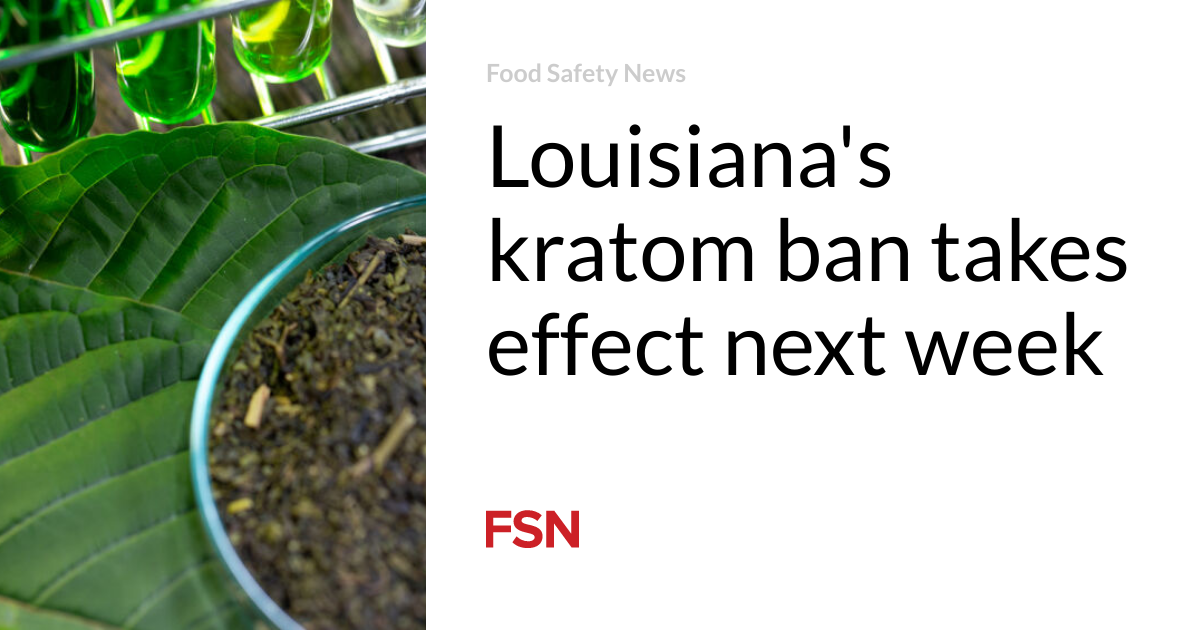Ever since the U.S. Drug Enforcement Administration (DEA) tried in 2016 to classify kratom as a dangerous Schedule 1 drug, states have been on their own. That’s because the Obama DEA backed off when there was a public backlash.
Schedule I drugs, substances, or chemicals are defined as drugs with no currently accepted medical use and a high potential for abuse. Schedule I drugs include: heroin, lysergic acid diethylamide (LSD), marijuana (cannabis), 3,4-methylenedioxymethamphetamine (ecstasy), methaqualone and peyote.
On Aug 1, Louisiana will become the seventh state to ban kratom entirely. Kratom is a tropical tree (Mitragyna speciosa) that is native to Southeast Asia. Kratom is not lawfully marketed in the U.S. as a drug product, a dietary supplement, or a food additive in conventional food.
Brands with kratom leaves are available in the U.S. through sales on the internet and at brick-and-mortar stores, especially those selling tobacco and vape products. Kratom is often used to self-treat conditions such as pain, coughing, diarrhea, anxiety, depression, opioid use disorder and opioid withdrawal.
An estimated 1.7 million Americans aged 12 and older used kratom in 2021, according to the Substance Abuse and Mental Health Services Administration’s National Survey on Drug Use and Health.
In Louisiana, convenience stores are hustling to sell their kratom inventories by July 31. The next day, the Pelican State joins Alabama, Arkansas, Indiana, Wisconsin, Vermont, and Rhode Island in banning kratom products. Other states and numerous local governments have imposed age limits, requiring that purchasers be over 18 or 21 years of age.
The Food and Drug Administration has expressed concern about the two main chemical components of kratom — mitragynine and 7-hydroxymitragynine (7-OH-mitragynine) — being marketed as drug products. The FDA has not approved any prescription or over-the-counter drug products containing kratom or those two main chemical components. It recently warned seven companies for illegally marketing products containing 7-hydroxymitragynine ( 7-OH).
FDA said it has a “growing concern around novel potent opioid products being marketed to U.S. consumers and sold online and in smoke shops, gas stations, and corner stores.” While 7-OH occurs naturally in trace amounts in kratom, the agency’s letters focus on concentrated 7-OH products such as tablets, gummies, drink mixes, and shots, which may be dangerous.
FDA warns the public that kratom can cause liver toxicity, seizures and substance use disorder.
“Our convenience stores are loaded with this bad, bad stuff,” said state Rep. Debbie Villio, R-Kenner. She sponsored the Louisiana kratom ban that passed the House 89-to-5 and the Senate 26-to-11. It was signed into law June 4 by Gov. Effrey Martin Landry.
Louisiana’s Alcohol and Tobacco Control promises to enforce the new law statewide.
Anyone convicted of having less than 20 grams of kratom would get a $100 fine, and anything more than 20 grams would get up to 6 months in jail or a fine of up to $1,000. Anyone convicted of distributing kratom would face between 1 and 5 years in prison or a fine of up to $50,000.
ATC Commissioner Ernest Legier said inspections and compliance warnings have been underway since July 1. “We are watching and we are going to make sure public safety is a priority,” he said.
Neighboring Mississippi opted not to implement a ban during its 2025 legislative session. Lawmakers did successfully pass two House bills: one that requires kratom purchasers to be 21 years of age or older and another that adds an excise tax to kratom. Those new regulations took effect on July 1.
According to a University of Mississippi study published in the American Journal of Public Health, nearly three-fourths of tobacco and vape stores in the United States sell the addictive product. That study included an estimate that two million people in the U.S. used kratom in the past year.
Ali Garawi, co-founder of Dialed Moods, a brand committed to ethical kratom sourcing, education and advocacy, says the Louisiana ban is a big mistake.
“It is incredibly disappointing to see that Louisiana is banning all kratom products. This ancient plant from Southeast Asia has shown great promise for pain management, anxiety, energy, and focus, but it is incredibly misunderstood in the West, Garawi said. “Unfortunately, misinformation spreads like wildfire, leaving people thinking that kratom is dangerous and synthetic. “
“The truth is that kratom dosed in its naturally occurring form is safe and effective,” he continued in a statement provided to Food Safety News. “At Dialed Moods, we third-party lab test all our products and never use synthetic versions of the plant. Kratom needs basic, common-sense regulations, but a full ban will only push this billion-dollar industry further into the shadows with bad actors who care nothing about safety.”
“As a state with one of the highest drug overdose rates in the country, Louisiana is missing out on a potentially life-saving plant,” he added. “Naturally occurring kratom has shown real hope for those battling opioid addiction, and it’s a shame to think that locals facing chronic pain and other challenges or even just looking for alternative supplementation will likely resort to drugs and big pharma.”
A 2020 Johns Hopkins study cited by Garawi concluded that the kratom psychoactive compound, somewhat similar to opioids, likely has a lower rate of harm than prescription opioids for treating pain, anxiety, depression and addiction.
(To sign up for a free subscription to Food Safety News, click here.)
Source link
